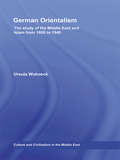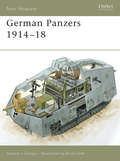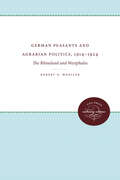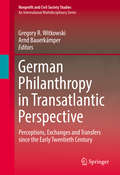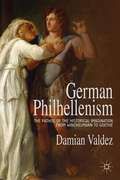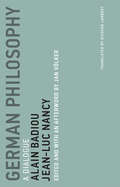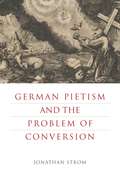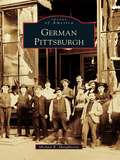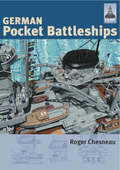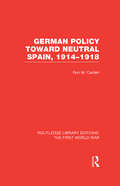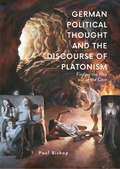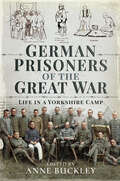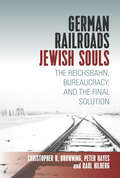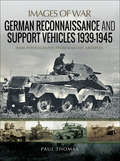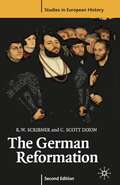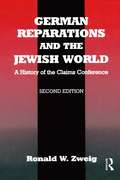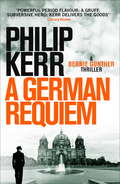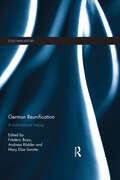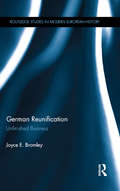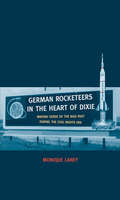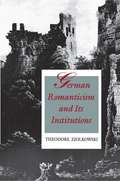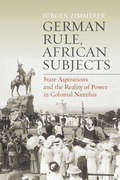- Table View
- List View
German Order of Battle: Panzer, Panzer Grenadier, and Waffen SS Divisions in WWII (Stackpole Military History Series)
by Samuel W MitchamThe third volume in this definitive reference on the German Army in WWII, covering the organization, combat histories, and commanders of each division. Military historian Samuel Mitcham is a noted expert in Germany&’s ground forces during the Second World War. In his three-volume German Order of Battle, he presents the most detailed and authoritative reference work on the subject to date. Mitcham&’s narrative histories highlight the organization, commanders, experiences, and casualties of each division, as well as sources for further research. Taken together, these volumes are the most comprehensive and accessible reference available on the Germany Army in World War II, unmatched in the information compiled on each division from inception to destruction. Volume Three covers the Panzer, Panzer Grenadier, and Waffen SS Divisions.
German Orientalism: The Study of the Middle East and Islam from 1800 to 1945 (Culture and Civilization in the Middle East)
by Ursula WokoeckDuring the nineteenth century and the first half of the twentieth, German universities were at the forefront of scholarship in Oriental studies. Drawing upon a comprehensive survey of thousands of German publications on the Middle East from this period, this book presents a detailed history of the development of Orientalism. Offering an alternative to the view of Orientalism as a purely intellectual pursuit or solely as a function of politics, this book traces the development of the discipline as a profession. The author discusses the interrelation between research choices and employment opportunities at German universities, examining the history of the discipline within the framework of the humanities. On that basis, topics such as the establishment of Oriental philology; the process of institutional differentiation between the study of Semitic languages and the study of Sanskrit and comparative linguistics; the emergence of Assyriology; and the partial establishment of Islamic studies are explored. This unique perspective on the history of Oriental studies in the German tradition contributes to the understanding of the wider history of the field, and will be of great interest to scholars and students of Middle East studies, history, and German history in particular.
German Panzers 1914-18
by Steven Zaloga Brian DelfPanzer warfare is synonymous with the Wehrmacht of World War II. This book examines the story of the Panzer's more mysterious ancestors, the little-known panzers of the Great War. Germany was very slow to develop armored vehicles compared to Britain and France. Efforts to catch-up proved difficult, and only a few dozen German A7V tanks were completed in time to take part in the final campaigns of 1918. As a result, the majority of German panzer units actually used captured British tanks, the Beutepanzer. This book will trace the development of German panzers of the World War One, including the A7V and its intended but unfinished stablemates.
German Peasants and Agrarian Politics, 1914-1924: The Rhineland and Westphalia
by Robert G. MoellerRobert Moeller investigates the German peasantry's rejection of the Weimar Republic in the 1920s and provides a new interpretation of Catholic peasant conservatism in western Germany. According to Moeller, rural support for conservative political solutions to the troubled Weimar Republic was the result of a series of severe economic jolts that began in 1914 and continued unabated until 1933.During the late nineteenth century, peasant farmers in the Rhineland and Wesphalia adjusted their production to a capitalist market and enjoyed an unprecedented period of prosperity that lasted until the outbreak of World War I. After August 1914 peasant producers confronted state intervention in the agricultural sector, regulation of prices and markets, and the subordination of agrarian interests to the demands of urban consumers. A controlled economy for many agricultural products continued into the postwar period.Focusing on the Catholic peasantry, Moeller shows that peasant rejection of the Weimar Republic was firmly grounded in the immediate circumstances of the war economy and the uneven process of postwar recovery. He challenges the dominant view that rural support for conservative political solutions was primarily the product of the peasantry's hostility toward industrial capitalism and of long-term social and political affinities dating from the nineteenth century. Moeller's findings show that conservative agrarian ideology was carefully formulated in response to the specific peasant grievances that originated in this period of continuing economic and political crisis.Originally published in 1986.A UNC Press Enduring Edition -- UNC Press Enduring Editions use the latest in digital technology to make available again books from our distinguished backlist that were previously out of print. These editions are published unaltered from the original, and are presented in affordable paperback formats, bringing readers both historical and cultural value.
German Philanthropy in Transatlantic Perspective
by Gregory R. Witkowski Arnd BauerkämperThis volume examines philanthropic practices against the backdrop of the continuities, disruptions and changes in twentieth century German socio-political relations. It presents a differentiated understanding of the relationship between philanthropy and civil society that traces this connection from Germany's first democracy, the Weimar Republic, through the Nazi dictatorship and Soviet-style rule in Communist East Germany to the stable democracy of the Federal Republic of Germany. While concentrating on Germany, this volume places German philanthropy in a triangular relationship with the United States and the developing world, primarily through Africa. In particular, the contributions to the book demonstrate that despite many transatlantic exchanges between German and American philanthropic organizations, these relationships should not be reduced to bilateral exchanges but rather seen in the context of a globalizing world. More generally, this transnational study is a reminder that philanthropic activities need to be placed into their specific historical contexts. Such an analytical framework allows for more dynamic understanding of the meaning of philanthropy in society, illustrating both enduring and changing practices.
German Philhellenism
by Damian ValdezPhilhellenism the fascination with the art, politics, religion and society of ancient Greece- is a powerful and compelling phenomenon in German culture and intellectual history, creating a language and a series of key ideas that were to exert a continuous influence on German thought, aesthetics and politics well into the twentieth century. In this book Valdez examines the first generation of German Philhellenes from Winckelmann to Goethe. He shows how German Philhellenism was torn between the search for a historical whole which could explain and encompass Greek excellence, and the desire to incorporate individual aspects of Greece in a wider ethical and artistic enterprise, and finally, to give it a place in the history of freedom itself. Valdez also shows that German philhellenic ideas grew out of a dialogue with French and British ideas and historiography. He charts how the fascination with Greek antiquity was reflected in theatre and literature and how the longings and idealisation of Philhellenes clashed with the more critical and sober historians of the Enlightenment. The book also explains how the search for the historical reality of philhellenic ideals created intense emotional and ideological conflicts about the unique nature of male friendship in ancient Greece and about the position of women in ancient Athens.
German Philosophy: A Dialogue (Untimely Meditations #11)
by Alain Badiou Jean-Luc NancyTwo eminent French philosophers discuss German philosophy—including the legacy of Kant, Hegel, Nietzsche, Adorno, Fichte, Marx, and Heidegger—from a French perspective. In this book, Alain Badiou and Jean-Luc Nancy, the two most important living philosophers in France, discuss German philosophy from a French perspective. Written in the form of a dialogue, and revised and expanded from a 2016 conversation between the two philosophers at the Universität der Künste Berlin, the book offers not only Badiou's and Nancy's reinterpretations of German philosophers and philosophical concepts, but also an accessible introduction to the greatest thinkers of German philosophy. Badiou and Nancy discuss and debate such topics as the legacies of Kant, Hegel, and Marx, as well as Nietzsche, Adorno, Fichte, Schelling, and the unavoidable problem of Heidegger and Nazism. The dialogue is contentious, friendly, and often quotable, with strong—at times passionate—positions taken by both Badiou and Nancy, who find themselves disagreeing over Kant, for example, and in unexpected agreement on Marx, for another. What does it mean, then, to conduct a dialogue on German philosophy from a French perspective? As volume editor Jan Völker observes, “German philosophy” and “French philosophy” describe complex constellations that, despite the reference to nation-states and languages, above all encompass shared concepts and problems—although these take a range of forms. Perhaps they can reveal their essential import only in translation.
German Pietism and the Problem of Conversion (Pietist, Moravian, and Anabaptist Studies #3)
by Jonathan StromAugust Hermann Francke described his conversion to Pietism in gripping terms that included intense spiritual struggle, weeping, falling to his knees, and a decisive moment in which his doubt suddenly disappeared and he was “overwhelmed as with a stream of joy.” His account came to exemplify Pietist conversion in the historical imagination around Pietism and religious awakening. Jonathan Strom’s new interpretation challenges the paradigmatic nature of Francke’s narrative and seeks to uncover the more varied, complex, and problematic character that conversion experiences posed for Pietists in the seventeenth and eighteenth centuries.Grounded in archival research, German Pietism and the Problem of Conversion traces the way that accounts of conversion developed and were disseminated among Pietists. Strom examines members’ relationship to the pious stories of the “last hours,” the growth of conversion narratives in popular Pietist periodicals, controversies over the Busskampf model of conversion, the Dargun revival movement, and the popular, if gruesome, genre of execution conversion narratives. Interrogating a wide variety of sources and examining nuance in the language used to define conversion throughout history, Strom explains how these experiences were received and why many Pietists had an uneasy relationship to conversions and the practice of narrating them.A learned, insightful work by one of the world’s leading scholars of Pietism, this volume sheds new light on Pietist conversion and the development of piety and modern evangelical narratives of religious experience.
German Pittsburgh (Images of America)
by Michael R. ShaughnessyGerman Pittsburgh explores the multifaceted cultural history of German-speaking immigrants and residents in the Greater Pittsburgh area. Today over one quarter of the city's residents claim German heritage, the largest ethnic group in the region. German-speaking Pittsburghers include names like H. J. Heinz, Honus Wagner, and the Kaufmanns, and they produced beloved Pittsburgh beers such as Iron City and Penn Pilsner. It might be surprising to know that German was an official language of the city at one time, and a daily German newspaper was printed from the mid-1800s up through World War II. Today remnants of the German-speaking community can be found on the North Side, the South Side, Troy Hill, and Mount Oliver, to name a few. German Pittsburgh provides an overview of the contributions that this diverse ethnic community has made and is making today in the city.
German Pocket Battleships (ShipCraft #Vol. 1)
by Roger ChesneauEverything the ship modeller needs to know about building a famous warship Numerous detailed plans and colour illustrations Focuses on very popular modelling subjects which are represented by a wide selection of kits The 'ShipCraft' series provides in-depth information about building and modifying model kits of famous warship types. Lavishly illustrated, each book takes the modeller through a brief history of the subject class, using scale plans to highlight differences between sisterships and changes in their appearance over their careers, then moves to an extensive photographic survey of either a high-quality model or a surviving example of the ship. Hints on building the model, and on modifying and improving the basic kit, are followed by a section on paint schemes and camouflage, featuring numerous colour profiles and highly-detailed line drawings. The strengths and weaknesses of available kits of the ships are reviewed, and the book concludes with a section on research references—books, monographs, large-scale plans and relevant websites. For the first volume in this series, the author has chosen the German 'pocket battleships' of WW2, the best-known of which was the Graf Spee of Battle of the River Plate fame. This innovative and infamous class of surface raiders has long been a popular subject for ship modellers, many manufacturers producing kits of the Graf Spee and the rather different Admiral Scheer and Ltzow. This book will show ship modellers how to turn their kits into something really special, but its unparalleled level of visual information will also appeal to the more general warship enthusiast. Roger Chesneau is a lifelong ship modeller and author of numerous naval books, including Ship Models in Plastic.
German Policy Toward Neutral Spain, 1914-1918 (Routledge Library Editions: The First World War)
by Ron CardenThis volume describes and analyses the methods Germany used to reinforce Spain’s independence thereby preventing Madrid’s entry into the war on the Allied side. While there have been many studies dealing with the wartime economic histories of Holland, Switzerland, Denmark and Iceland, Spain, physically large and strategically situated has been largely ignored, with little American study of Spanish relations with the European belligerents having been done. Particular attention is paid to the forceful personality of Spanish King Alfonso XIII, who shrewdly used his special friendship with Kaiser Wilhelm II for Spanish profit: he remained a Francophile who shrewdly manipulated the Germans into thinking he favoured their side. At the same time Alfonso fended off the embrace of the Entente.
German Political Thought and the Discourse of Platonism: Finding the Way Out of the Cave
by Paul BishopTaking Plato’s allegory of the cave as its starting-point, this book demonstrates how later European thinkers can be read as a reaction and a response to key aspects of this allegory and its discourse of enchainment and liberation. Focusing on key thinkers in the tradition of European (and specifically German) political thought including Kant, Marx, Hegel, Nietzsche, Heidegger, and the Frankfurt School, it relates them back to such foundational figures as Rousseau, Aristotle, and in particular Plato. All these thinkers are considered in relation to key passages from their major works, accompanied by an explanatory commentary which seeks to follow a conceptual and imagistic thread through the labyrinth of these complex, yet fascinating, texts. This book will appeal in particular to scholars of political theory, philosophy, and German language and culture.
German Prisoners of the Great War: Life in a Yorkshire Camp
by Anne BuckleyGerman POWs held in England during WWI record their experience in this volume of detailed accounts, diary entries, drawings, and more. In Munich in 1920, just after the end of the First World War, German prisoners of war in England published a book they had written and smuggled back home. Through vivid text and illustrations, they describe their experience of life in a camp at Skipton in Yorkshire. Their work, now translated into English for the first time, gives us a unique insight into their feelings about the war, their captors, and their longing to go home. In their own words they record prison camp conditions, daily routines, their relationship with the prison authorities, their activities and entertainment, and their thoughts of their homeland. The challenges and privations they faced are part of their story, as is the community they created within the confines of the camp. The whole gamut of their existence is portrayed here, in particular through their drawings and cartoons which are reproduced alongside the translation. German Prisoners of the Great War offers an inside view of a hitherto neglected aspect of the wartime experience.
German Railroads, Jewish Souls: The Reichsbahn, Bureaucracy, and the Final Solution
by Christopher Browning Peter Hayes Raul Hilberg†Renowned Holocaust scholar Raul Hilberg considered the German railway system that delivered European Jews to ghettos and death camps in Eastern Europe to be not only an essential component of the “machinery of destruction” but also emblematic of the amoral bureaucracy that helped to implement the Jewish genocide. German Railroads, Jewish Souls centers around Hilberg’s seminal essay of the same name, a landmark study of German railways in the Nazi era long unavailable in English. Supplemented with additional writings from Hilberg, primary source materials, and historical commentary from leading scholars Christopher Browning and Peter Hayes, this is a rich and accessible introduction to a topic in Holocaust history that remains understudied even today.
German Reconnaissance and Support Vehicles, 1939–1945 (Images of War)
by Paul ThomasThis WWII pictorial history illustrates the full range of Nazi vehicles used in reconnaissance and support missions throughout the war. The German military used reconnaissance and support vehicles widely in the Second World War. This book illustrates the full range of these vehicles with authoritative information and more than 200 rare wartime photographs. Both tracked and wheeled vehicles were employed for reconnaissance and screening. These included light tanks such as the Panzer I and Panzer II, armored cars such as the six- and eight- wheeled Schwerer Panzerspähwagen, and motorcycles such as the famous BMW R75 or the Zundapp KS750. In addition to their recon role they would, on occasion, engage similar light units. Support vehicles such as the tracked Sd.Kfz.2 Kettenkrad, and the renowned Sd.Kfz.251 halftracks were used in the follow-up role, frequently with mounted grenadiers to mop up over-run enemy positions.
German Reformation (Studies in European History)
by R.W. ScribnerOver the past twenty years, new approaches to the history of the Reformation of the Church have radically altered our understanding of that event within its broadest social and cultural context. In this classic study R. W. Scribner provided a synthesis of the main research, with a special emphasis on the German Reformation, and presented his own interpretation of the period.Paying particular attention to the social history of the broader religious movements of the German Reformation, Scribner examined those elements of popular culture and belief which are now seen to have played a central role in shaping the development and outcome of the movements for reform in the sixteenth century. Scribner concluded that 'the Reformation', as it came to be known, was only one of a wide range of responses to the problem of religious reform and revival, and suggested that the movement as a whole was less successful than previously claimed.In the second edition of this invaluable text, C. Scott Dixon's new Introduction, supplementary chapter and bibliography continue Scribner's original lines of inquiry, and provide additional commentary on developments within German Reformation scholarship over the sixteen years since its first publication.
German Reparations and the Jewish World: A History of the Claims Conference
by Ronald W. ZweigGerman Reparations and the Jewish World" has become a standard reference work since it was first published. Based extensively on archival sources, the author examines the difficult debate within the Jewish world whether it was possible to reach a material settlement with Germany so soon after Auschwitz. Concentrating on how the money was spent in rebuilding Jewish life, he also analyzes how the reparations payments transformed the relations bteween Israel and the diaspora, and between different Jewish political and ideological groups. This revised and expanded edition includes material on sensitive relief programmes from archives that have only recently been opened to researchers. In a new, extensive introductory essay the author reexamines the reparations, restitution and indemnification processes from the perspective of 50 years later.
German Requiem: Bernie Gunther Thriller 3
by Philip Kerr'One of the greatest anti-heroes ever written' LEE CHILDThe war may be over, but the remnants of the Nazis are still causing trouble for Bernie Gunther - a hard-boiled noir thriller for fans of Raymond Chandler and John le CarréIn postwar Vienna, the term 'peace' is relative - the Americans, British and Russians govern the city in an uneasy truce, and the main difference is that now it's the Soviet secret police making people disappear rather than the Nazis. When Bernie is asked by a high-ranking Soviet official to clear an old Kripo colleague's name of the murder of an American officer, he quickly realises he's in over his head.Bernie's ex-colleague Becker was working for a secret society of Nazi hunters, tracking down and executing war criminals who faked their own deaths to escape the noose at Nuremberg. Infiltrating the group, Bernie finds himself face to face with men he thought he'd never see again. They've cheated justice once - now Bernie must see that they don't get away a second time.
German Requiem: Bernie Gunther Thriller 3 (Bernie Gunther)
by Philip Kerr'One of the greatest anti-heroes ever written' LEE CHILDThe war may be over, but the remnants of the Nazis are still causing trouble for Bernie Gunther - a hard-boiled noir thriller for fans of Raymond Chandler and John le CarréIn postwar Vienna, the term 'peace' is relative - the Americans, British and Russians govern the city in an uneasy truce, and the main difference is that now it's the Soviet secret police making people disappear rather than the Nazis. When Bernie is asked by a high-ranking Soviet official to clear an old Kripo colleague's name of the murder of an American officer, he quickly realises he's in over his head.Bernie's ex-colleague Becker was working for a secret society of Nazi hunters, tracking down and executing war criminals who faked their own deaths to escape the noose at Nuremberg. Infiltrating the group, Bernie finds himself face to face with men he thought he'd never see again. They've cheated justice once - now Bernie must see that they don't get away a second time.
German Requiem: Bernie Gunther Thriller 3 (Bernie Gunther)
by Philip Kerr'One of the greatest anti-heroes ever written' LEE CHILDThe war may be over, but the remnants of the Nazis are still causing trouble for Bernie Gunther - a hard-boiled noir thriller for fans of Raymond Chandler and John le CarréIn postwar Vienna, the term 'peace' is relative - the Americans, British and Russians govern the city in an uneasy truce, and the main difference is that now it's the Soviet secret police making people disappear rather than the Nazis. When Bernie is asked by a high-ranking Soviet official to clear an old Kripo colleague's name of the murder of an American officer, he quickly realises he's in over his head.Bernie's ex-colleague Becker was working for a secret society of Nazi hunters, tracking down and executing war criminals who faked their own deaths to escape the noose at Nuremberg. Infiltrating the group, Bernie finds himself face to face with men he thought he'd never see again. They've cheated justice once - now Bernie must see that they don't get away a second time.(P) 2021 Quercus Editions Limited
German Reunification: A Multinational History (Cold War History)
by Mary Elise Sarotte Frédéric Bozo Andreas RödderThis book provides a multinational history of German reunification based on empirical work by leading scholars. The reunification of Germany in 1989-90 was one of the most unexpected and momentous events of the twentieth century. Embedded within the wider process of the end of the Cold War, it contributed decisively to the dramatic changes that followed: the end of the division of Europe, the collapse of the Warsaw Pact, the origins of NATO’s eastward expansion and, not least, the creation of the European Union. Based on the wealth of evidence that has become available from many countries involved, and relying on the most recent historiography, this collection takes into account the complex interaction of multinational processes that were instrumental in shaping German reunification in the pivotal years 1989-90. The volume brings together renowned international scholars whose recent works, based on their research in multiple languages and sources, have contributed significantly to the history of the end of the Cold War and of German reunification. The resulting volume represents an important contribution to our knowledge and understanding of a significant chapter in recent history. This book will be of much interest to students of German politics, Cold war history, international and multinational history and IR in general.
German Reunification: Unfinished Business (Routledge Studies in Modern European History)
by Joyce E. BromleyIn 1945, German families with more than 100 hectares (247 acres) of land were forced from their homes in the eastern sector by the Soviets, now in control of that area. These families were brutally evicted from their property and had their land expropriated. In the next 45 years, the GDR government would come to control all of the agricultural land. At reunification in 1990, the earlier abuse of these farmers was compounded when the German government would not restore any of this expropriated land to these families. The German government falsely accused the Soviet Union of insisting on non-restitution as a condition of reunification. Soviet leader Mikhail Gorbachev unequivocally denies this claim and insists that land issues are a German problem to resolve. The temporary land-trust agency, established by the German government in 1990 to dispose of land it inherited from the GDR, continues to exist. After 25 years, this agency still holds almost 20 percent of this expropriated land. Its agents, most of whom were reared in GDR, decide who may (or may not) lease land, the conditions of the lease, and if and when a farmer may buy land – circumstances that remain deeply controversial. Joyce Bromley draws on extensive field research, and previously untapped sources, to explore the reliability of the government’s version of these important events. Is the German government once again, without shame, discriminating against a group of its own citizens?
German Rocketeers in the Heart of Dixie
by Dr Monique LaneyThis thought-provoking study by historian Monique Laney focuses on the U. S. government-assisted integration of German rocket specialists and their families into a small southern community soon after World War II. In 1950, Wernher von Braun and his team of rocket experts relocated to Huntsville, Alabama, a town that would celebrate the team, despite their essential role in the recent Nazi war effort, for their contributions to the U. S. Army missile program and later to NASA's space program. Based on oral histories, provided by members of the African American and Jewish communities, and by the rocketeers' families, co-workers, friends, and neighbors, Laney's book demonstrates how the histories of German Nazism and Jim Crow in the American South intertwine in narratives about the past. This is a critical reassessment of a singular time that links the Cold War, the Space Race, and the Civil Rights era while addressing important issues of transnational science and technology, and asking Americans to consider their country's own history of racism when reflecting on the Nazi past.
German Romanticism and Its Institutions
by Theodore ZiolkowskiUsing an illuminating method that challenges the popular notion of Romanticism as aesthetic escapism, Theodore Ziolkowski explores five institutions--mining, law, madhouses, universities, and museums--that provide the socio-historical context for German Romantic culture. He shows how German writers and thinkers helped to shape these five institutions, all of which assumed their modern form during the Romantic period, and how these social structures in turn contributed to major literary works through image, plot, character, and theme. "Ziolkowski cannot fail to impress the reader with a breadth of erudition that reveals fascinating intersections in the life and works of an artist.... He conveys the sense of energy and idealism that fueled Schiller and Goethe, Fichte and Hegel, Hoffmann and Novalis...."--Emily Grosholz, The Hudson Review "[This book] should be put in the hands of every student who is seriously interested in the subject, and I cannot imagine a scholar in the field who will not learn from it and be delighted with it."--Hans Eichner, Journal of English and Germanic Philology "Ziolkowski is among those who go beyond lip-service to the historical and are able to show concretely the ways in which generic and thematic intentions are inextricably enmeshed with local and specific institutional circumstances."--Virgil Nemoianu, MLN
German Rule, African Subjects: State Aspirations and the Reality of Power in Colonial Namibia
by Jürgen ZimmererAlthough it lasted only thirty years, German colonial rule dramatically transformed South West Africa. The colonial government not only committed the first genocide of the twentieth century against the Herero and Nama, but in their efforts to establish a “model colony” and “racial state,” they brought about even more destructive and long-lasting consequences. In this now-classic study—available here for the first time in English—the author provides an indispensable account of Germany's colonial utopia in what is present-day Namibia, showing how the highly rationalized planning of Wilhelmine authorities ultimately failed even as it added to the profound immiseration of the African population.

